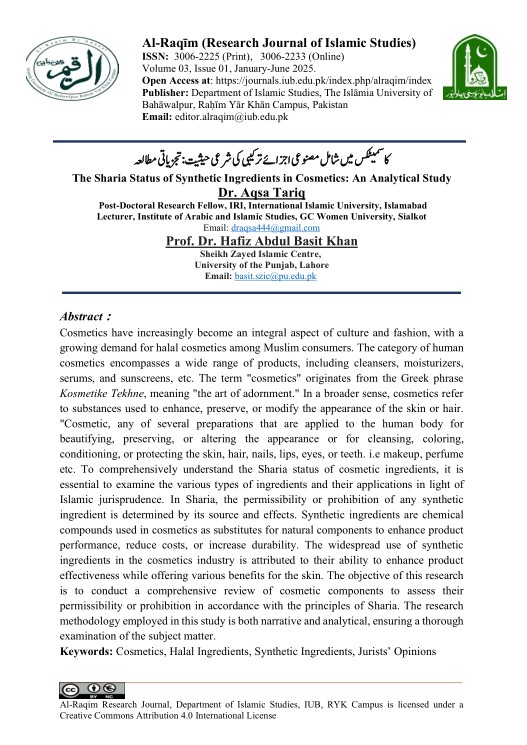کاسمیٹکس میں شامل مصنوعی اجزائے ترکیبی کی شرعی حیثیت:تجزیاتی مطالعہ
The Sharia Status of Synthetic Ingredients in Cosmetics: An Analytical Study
Keywords:
Cosmetics, Halal Ingredients, Synthetic Ingredients, Jurists’ OpinionsAbstract
Cosmetics have increasingly become an integral aspect of culture and fashion, with a growing demand for halal cosmetics among Muslim consumers. The category of human cosmetics encompasses a wide range of products, including cleansers, moisturizers, serums, and sunscreens, etc. The term "cosmetics" originates from the Greek phrase Kosmetike Tekhne, meaning "the art of adornment." In a broader sense, cosmetics refer to substances used to enhance, preserve, or modify the appearance of the skin or hair. "Cosmetic, any of several preparations that are applied to the human body for beautifying, preserving, or altering the appearance or for cleansing, coloring, conditioning, or protecting the skin, hair, nails, lips, eyes, or teeth. i.e makeup, perfume etc. To comprehensively understand the Sharia status of cosmetic ingredients, it is essential to examine the various types of ingredients and their applications in light of Islamic jurisprudence. In Sharia, the permissibility or prohibition of any synthetic ingredient is determined by its source and effects. Synthetic ingredients are chemical compounds used in cosmetics as substitutes for natural components to enhance product performance, reduce costs, or increase durability. The widespread use of synthetic ingredients in the cosmetics industry is attributed to their ability to enhance product effectiveness while offering various benefits for the skin. The objective of this research is to conduct a comprehensive review of cosmetic components to assess their permissibility or prohibition in accordance with the principles of Sharia. The research methodology employed in this study is both narrative and analytical, ensuring a thorough examination of the subject matter.

Downloads
Published
Issue
Section
License
Copyright (c) 2025 Dr. Aqsa Tariq, Prof. Dr. Hafiz Abdul Basit Khan

This work is licensed under a Creative Commons Attribution-NonCommercial 4.0 International License.




